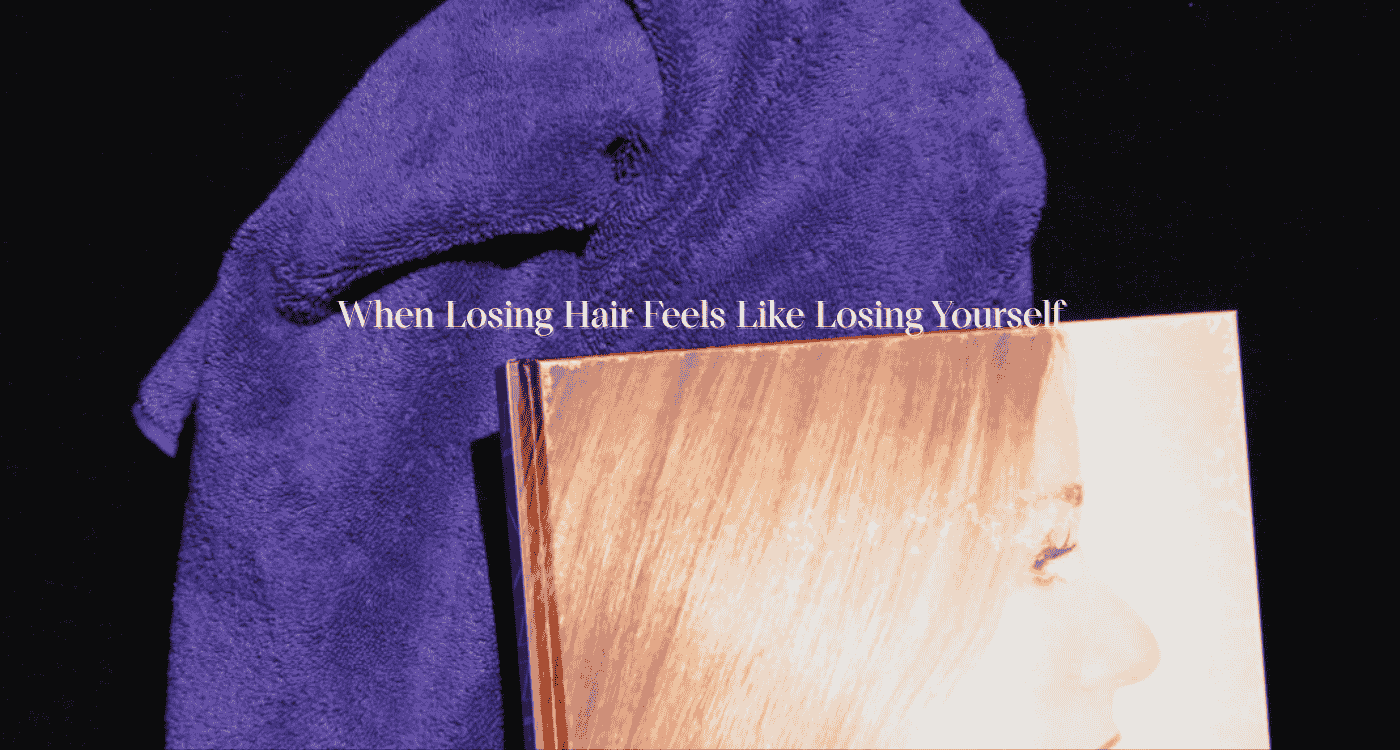Hair Loss and Depression: Understanding the Psychological Impact and Solutions

Introduction: Why Hair Loss and Mental Health Are Linked
Hair loss depression is more than a cosmetic concern—it is a deeply personal health challenge that affects identity, confidence, and quality of life. Research suggests that hair loss often triggers symptoms of depression, emotional distress, and even major depressive disorder. Whether caused by telogen effluvium, androgenetic alopecia, or other forms of alopecia, the psychological impact of hair loss can be just as significant as the physical symptoms.
This article explores how depression and hair loss are connected, how one condition can worsen the other, and what treatment options both medical and holistic can help.
What Is the Psychological Impact of Hair Loss?
Hair loss is often accompanied by psychological distress, including lowered self-esteem, social anxiety, and social withdrawal. Studies published in the Journal of Dermatology reveal that individuals facing progressive hair loss report higher levels of depression symptoms, especially when baldness or thinning disrupts daily life.
For many, hair is tied to cultural identity and self-expression. Losing it can create a perceived loss of control, leading to body dysmorphic disorder in severe cases. The emotional distress associated with this process has been compared to chronic illnesses in its effect on mental health.
Can Depression Cause Hair Loss?
Yes. Clinical evidence shows that depression can cause hair loss through both biological and behavioral pathways:
-
Stress hormones such as cortisol disrupt the hair growth cycle, pushing follicles into the shedding phase (telogen effluvium).

-
Chronic stress and mental illness often reduce appetite and impair nutrient absorption, leading to nutritional deficiencies (iron, vitamin D, zinc, B vitamins)—all linked to hair shedding.
-
Certain medications used to treat depression, including selective serotonin reuptake inhibitors (SSRIs) and norepinephrine reuptake inhibitors (NRIs), have been associated with temporary diffuse hair loss.
This highlights the need to treat both mental health conditions and physical health together, since the connection is bi-directional.
Can Hair Loss Cause Depression?
Absolutely. Studies in Clinical Dermatology report that up to 50% of individuals with hair loss experience depression symptoms. The reasons include:
-
Changes in physical appearance → leading to lower self-esteem and avoidance of social situations.
-
Stigma and social withdrawal → hair loss is often misinterpreted as a sign of aging, illness, or poor health.
-
Daily life disruptions → difficulty participating in social events, professional stress, and reduced quality of life.
For some, the psychological burden escalates to thoughts of suicide, emphasizing the need for medical and psychological support.
Can depression and anxiety make you lose hair?
Yes. Depression and anxiety can lead to hair loss by triggering hormonal imbalances and stress responses that disrupt the hair growth cycle. This can result in telogen effluvium, a condition where hair follicles prematurely enter the shedding phase. Addressing both mental well-being and scalp health is critical to reducing this effect.
Types of Hair Loss Associated with Depression
-
Telogen Effluvium – Stress-induced shedding, often temporary.
-
Alopecia Areata – Autoimmune condition that can worsen with psychological stress.
-
Androgenetic Alopecia (Pattern Hair Loss) – Can trigger depression due to progressive nature.
-
Diffuse Hair Loss – Linked with nutritional deficiencies and chronic stress.
Understanding the type of hair loss is essential in designing the right treatment plan.
The Role of Stress and Chronic Illness
-
Chronic stress disrupts hormonal balance and accelerates aging of hair follicles.
-
Major depressive disorder is strongly associated with physical symptoms like hair shedding, fatigue, and skin conditions.
-
Stressful life events—such as grief, job loss, or trauma—can act as triggers for both depression and hair loss.
Treatment Options: A Dual Approach
Medical Interventions
-
Antidepressant review → consult your physician if SSRIs or NRIs are suspected to worsen hair loss.
-
Nutritional supplementation → iron, vitamin D, and zinc support scalp health.
-
FDA-approved hair loss treatments → minoxidil and finasteride (though the latter is not suitable for all).

Holistic and Lifestyle Approaches
Addressing hair loss and depression often requires an integrative approach that extends beyond conventional treatments. Evidence shows that lifestyle factors—particularly nutrition, stress management, and sleep—play a significant role in both mental health and hair vitality.
Nutrition and Mood
Diet strongly influences brain chemistry and the hair growth cycle. Deficiencies in iron, zinc, vitamin D, B-vitamins, and omega-3 fatty acids are linked to both depressive symptoms and increased risk of hair shedding. Incorporating nutrient-dense foods can help regulate neurotransmitters, stabilize mood, and provide essential building blocks for healthy follicles:
-
Fatty Fish (salmon, sardines, mackerel): Rich in omega-3 fatty acids, which support neuronal function, lower inflammation, and promote scalp circulation.
-
Leafy Greens (spinach, kale): Provide folate and iron, essential for red blood cell production and oxygen delivery to hair follicles.
-
Nuts and Seeds (walnuts, chia, flax, pumpkin seeds): Sources of zinc, selenium, and magnesium—minerals associated with reduced anxiety and improved keratin structure.
-
Fermented Foods (yogurt, kefir, kimchi, sauerkraut): Enhance gut microbiome diversity, which influences serotonin production and stress resilience.
-
Berries and Citrus Fruits: High in antioxidants and vitamin C, which combat oxidative stress and protect hair follicle aging.
Lifestyle Practices
Mind–body practices such as yoga, meditation, and controlled breathing reduce cortisol, a hormone that accelerates follicle miniaturization and premature entry into the telogen (shedding) phase. Regular exercise improves blood flow, enhancing nutrient delivery to the scalp while elevating endorphins that buffer against low mood. Consistent sleep and natural sunlight exposure also regulate circadian rhythms and vitamin D synthesis, both vital for hair renewal and emotional balance.
Taken together, these lifestyle interventions illustrate how interconnected physical health, nutrition, and mental well-being are—and how addressing them in tandem can reduce the dual burden of hair loss and depression.
Coping Strategies for Daily Life
-
Acknowledge symptoms of depression early and seek help.
-
Engage in social situations, even when it feels uncomfortable—this helps counteract isolation.
-
Talk therapy has been proven to improve both mood and self-perception in individuals experiencing hair loss.
-
Mindful scalp care rituals (gentle massage, nourishing botanicals) can provide a sense of routine and control.

Conclusion: A Holistic Path Forward
The connection between hair loss and depression is clear: one condition worsens the other, creating a cycle of physical and psychological stress. Breaking this cycle requires:
-
Treating mental illness with proper therapy and, if necessary, medication.
-
Addressing the causes of hair loss, whether through dermatological care, nutritional support, or lifestyle modifications.
-
Recognizing that hair health is inseparable from mental health.
By combining science, nature, and compassionate care, individuals can find both effective treatment and renewed confidence.
Frequently Asked Questions About Hair Loss and Depression
1. Can depression really cause hair loss?
Yes. Studies show that depression and chronic stress can alter hormone levels, immune responses, and blood flow to the scalp, which can disrupt the hair growth cycle and accelerate shedding.
2. Is hair loss from depression permanent?
In many cases, no. Once depression and stress are managed, hair follicles often return to their natural growth cycle. Regrowth may take several months, depending on individual health factors and treatment.
3. How does hair loss affect mental health?
Hair loss can lower self-esteem, heighten anxiety, and contribute to depressive symptoms. Because hair is tied to identity and confidence, thinning or baldness may intensify emotional stress — creating a cycle between mental health and hair health.
4. What are the signs that my hair loss might be stress- or depression-related?
Stress-related shedding (telogen effluvium) often appears as sudden, diffuse thinning across the scalp a few months after a stressful event. A physician can help determine if hair loss is linked to psychological factors or another medical condition.
5. What treatments can address both depression and hair loss?
A combined approach works best: therapy or counseling, physical activity, mindfulness practices, and evidence-based dermatologic treatments. Nutritional support and scalp care can further strengthen hair and support mental well-being.
6. When should I seek professional help?
If hair loss is rapid, persistent, or accompanied by emotional distress, consult both a dermatologist and a mental health professional. Early intervention helps address underlying causes and prevents the cycle of hair loss and depression from worsening.
Sources:
Dhami L. Psychology of Hair Loss Patients and Importance of Counseling. Indian J Plast Surg. 2021 Dec 31;54(4):411-415. doi: 10.1055/s-0041-1741037. PMID: 34984078; PMCID: PMC8719979. https://pmc.ncbi.nlm.nih.gov/articles/PMC8719979/
Cash TF. The psychology of hair loss and its implications for patient care. Clin Dermatol. 2001 Mar-Apr;19(2):161-6. doi: 10.1016/s0738-081x(00)00127-9. PMID: 11397595. https://pubmed.ncbi.nlm.nih.gov/11397595/
Aukerman EL, Jafferany M. The psychological consequences of androgenetic alopecia: A systematic review. J Cosmet Dermatol. 2023; 22: 89–95. https://pubmed.ncbi.nlm.nih.gov/35403805/
Smith, J. Patrick and Rhonda M Merwin. “The Role of Exercise in Management of Mental Health Disorders: An Integrative Review” https://pmc.ncbi.nlm.nih.gov/articles/PMC8020774/





Leave a comment